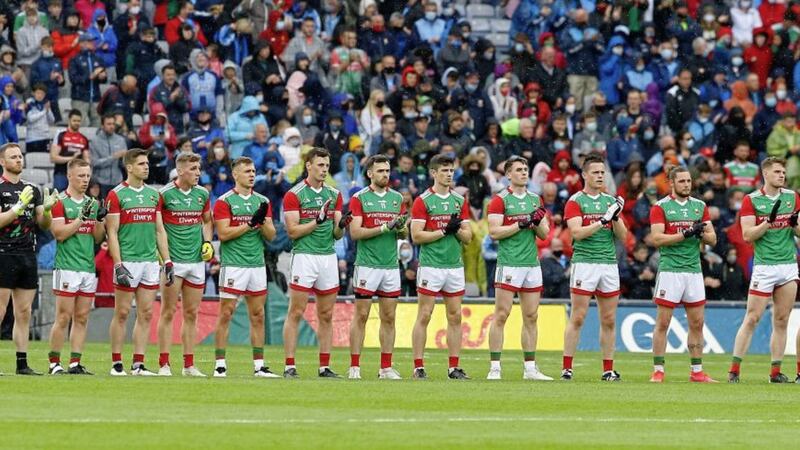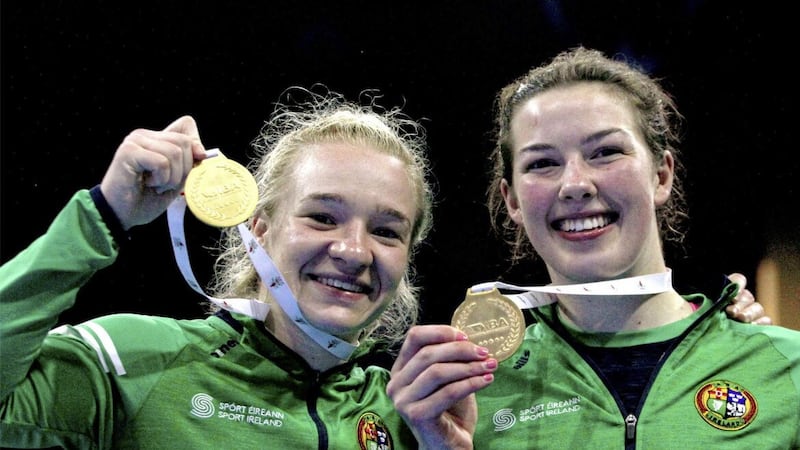AND there you had it. Unfolding in front of our eyes, under the blinding floodlights of Croke Park last Saturday evening, Dublin’s first and quite spectacular Championship defeat since Jim McGuinness plotted their downfall back in 2014.
After winning six All-Irelands in a row, Dublin losing a Championship match was always going to be a spectacular event – and we probably could have guessed the team to inflict such an historic defeat: Mayo.
With impressive nerdish detail, my colleague Cahair O’Kane captured the magnitude of Dublin’s All-Ireland semi-final exit in one tweet.
“2,540 days,” Cahair tweeted. “45 games. Six All-Irelands in a row. Brian Fenton's first ever championship defeat. Highly unlikely we'll ever see a run like it again. Dublin have been unbelievable, but football needed it to end. And nobody deserved to end it more than Mayo. Unreal drama.”
Thank heavens Mayo didn’t heed the ‘winning’ template offered up by Jack O’Connor after this year’s boring Leinster final.
Apparently the Kildare manager felt that sitting deep, allowing Dublin to dictate the terms of engagement, amassing a paltry 1-9 tally and coughing up 20 points was how the champions’ reign would eventually end.
It was one of the most bizarre post-match interviews we’ve heard, especially from a man who weaved together some memorable All-Ireland summers with Kerry during the ‘Noughties’.
The ‘winning’ template to overcome the Dubs was always something entirely different. You press, you squeeze Dublin’s kick-outs, engage them higher up the field, you be aggressive in everything you do, and you try and out-last them.
It takes tremendous bravery, fitness, temperament, self-belief and talent of course.
Mayo have always had these characteristics in spades. In the past, in those final moments of big games, Mayo just couldn’t match the game-changers that resided on Dublin’s bench. Nobody could.
Last Saturday, Dublin manager Dessie Farrell sprung Colm Basquel, Tom Lahiff, Sean Bulger, ageing warrior Philly McMahon, Sean McMahon, Robbie McDaid and Aaron Byrne from the Sky Blues bench.
In their epic 2017 All-Ireland decider, Jim Gavin was able to summon Paul Flynn, Diarmuid Connolly, Kevin McManamon, Bernard Brogan, Cormac Costello and Niall Scully from his bench.
You didn’t need a wide lens to realise that the end was in sight for this Dublin team. They couldn’t keep on winning All-Irelands, although the movers and shakers in the punditry world were nervous about signalling their demise ahead of the Mayo clash last weekend.
And lest we forget the warriors that had come and gone on the Mayo team-sheet over the past year or so.
Surely Mayo couldn’t beat the Dubs without the likes of Colm Boyle, Chris Barrett, Andy Moran, Tom Parsons, Donnie Vaughan, the injured Cillian O’Connor and highly-rated defender Oisin Mullin.
Could you imagine beating the Dubs without Cillian O’Connor? It was unthinkable.
But then again the Dubs were without Stephen Cluxton and Paul Mannion – for reasons that have never been properly explained.
And yet, the great deal-clinchers of our time couldn’t close out last Saturday’s semi-final despite Dean Rock putting them two up in the closing stages of normal time.
In the final throes of last week’s historic encounter we watched the champions capitulate. It wasn’t pretty either. It rarely is when great champions fall.
There were more unseemly incidents of pulling and dragging and nipping and ‘sledging’ and desperate acts of gamesmanship that would have put Uruguay soccer teams of the past to shame.
Contrary to popular opinion, the dark arts have never been confined to the ‘Nordies’.
There are practitioners of the dark arts right across the top teams in the country.
Champions get cranky. Sometimes great players do things that illustrate how discipline begins to slip, even among the imperturbable.
A case in point was James McCarthy’s straight arm to throat of Mayo’s Diarmud O’Connor when the sides were tied in the seventh minute of stoppage-time and with extra-time beckoning.
It was the kind of act you wouldn’t associate with a player of McCarthy’s ilk – but success blunts you in different ways.
In lashing out at O’Connor, the Ballymun clubman was gambling everything, including Dublin’s pursuit of a seventh All-Ireland title.
This singular act of indiscipline also suggested that Dublin’s appetite for more medals had been sated.
In an interview with Irish Times journalist Malachy Clerkin in January of this year, McCarthy didn’t feel much euphoria from winning last year’s All-Ireland in an empty Croke Park.
“It’s funny,” McCarthy told Clerkin. “It’s the kind of All-Ireland that will probably be packed away and nearly forgotten about. Well, not forgotten about but it’s definitely a bit different from the others… It was an All-Ireland that was there to be won and you take it for what it was.”
It’s true Dublin were always going to be deemed weakened when they eventually fell. How could any team in the country compete with their bench of only a couple of seasons ago?
But what’s remarkable is the sheer swiftness of Mayo’s rebuild. As the weeks clicked by last year, it seemed another Mayo legend was hanging up his inter-county boots - and yet here they were last Saturday night doing what all those great players did when they played – they just kept running at Dublin.
They still have enough of that old guard with them – Rob Hennelly, Lee Keegan, Aidan O’Shea, Diarmuid O’Connor and Kevin McLoughlin – but the ascension of others has been quite incredible including Tommy Conroy, Padraig O’Hora, 2020 young footballer of the year Oisin Mullin, Matthew Ruane and Stephen Coen.
A huge chunk of the credit for regenerating Mayo, not to mention toppling Dublin, must go to manager James Horan.
Few inter-county managers suffered like him over the years but he went away, learned, and came back for a second stint when most people suspected Mayo were a busted flush.
For the most part, he ambled up and down the Croke Park sideline last Saturday evening, arms behind his back, like one of Plato’s philosopher kings.
Some man. Some resilience.
Imagine football without Mayo.







